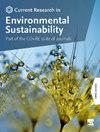Harvesting living labs outcomes through learning pathways
IF 3.7
Q2 ENVIRONMENTAL SCIENCES
Current Research in Environmental Sustainability
Pub Date : 2025-01-01
DOI:10.1016/j.crsust.2024.100277
引用次数: 0
Abstract
Living labs have emerged as a long-term, collaborative approach to addressing complex societal challenges, such as sustainable land and water management and climate change adaption. While these transdisciplinary environments foster continuous knowledge exchange and interactions among actors from diverse disciplines and sectors, the role of learning in realizing the impacts of living labs on participating actors and broader society is often underexplored. This paper aims to identify and analyze learning that occurs within a sequence of co-creative activities and their resulting outcomes, using the concept of ‘learning pathways’. The ‘living lab learning framework’ provides a systematic approach to organizing and categorizing living lab activities, enabling to infer learning pathways. An ex-post analysis of an empirical case study on a climate adaptation project, KLIMAP, resulted in seven distinct learning pathways: 1) harnessing collective integrated knowledge, 2) building collaborative networks, 3) enhancing stakeholder capacity, 4) adapting and contextualizing knowledge, 5) diffusing knowledge, 6) facilitating co-creation, and 7) reflecting on learning. These pathways were developed by examining the types of learning activities, their processes, and the entities involved, linking them to the outcomes achieved. The findings highlight that learning pathways contribute to identifying outcomes and broader impacts of living labs.
求助全文
约1分钟内获得全文
求助全文
来源期刊

Current Research in Environmental Sustainability
Environmental Science-General Environmental Science
CiteScore
7.50
自引率
9.10%
发文量
76
审稿时长
95 days
 求助内容:
求助内容: 应助结果提醒方式:
应助结果提醒方式:


